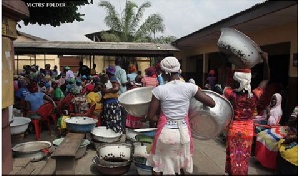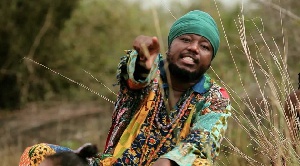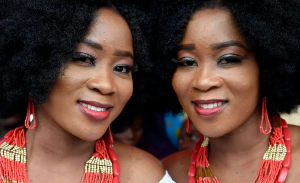Opinions of Thursday, 16 November 2023
Columnist: Isaac Ataaba
Inclusive urbanization: The plight of young female head porters
The transformative force of urbanization is reshaping the cityscapes of Ghana, especially Accra and Kumasi, presenting a dynamic interplay of both opportunities and challenges.
Within the vibrant tapestry of expanding urban centres, a demographic often marginalized in discussions of inclusive development emerges young female head porters, colloquially referred to as "kayaye". Originating from rural areas, especially in the northern part of Ghana, with aspirations of improved prospects, these young women become ensnared in a cycle of poverty and exploitation upon their arrival in the bustling heart of the cities of Accra and
Kumasi.
The Kayaye situation:
At the marketplaces and lorry stations on the outskirts of the major cities in Ghana, one can hear people screaming “kaya-yoo or “paa-o-paa” resounding, as young women and girls come running with heavy loads on top of their heads. Young women and girls are paid a pittance as they are hired by people to carry goods from one place to another. From time to time, as little as one Ghana cedi (less than 1 USD) is paid to them for their toil.
These girls transport people’s heavy foodstuffs and other goods with a large head pan on top of their heads. Most of these women have their babies with them wrapped around their backs as they carry their loads on their heads. These women could be seen as harbouring heavy physical burdens, with the heaviest of them all being the burden of feeling lost coming from the northern part of
Ghana to the large cities for a variety of reasons.
These women are all Northerners, mostly Frafras, Dagombas, Gonjas, Wallis, and Tampulmas, coming from families where African Traditional Region (ancestor worship) and Islam are experienced. With some running away from poverty and problems in their households, many come to the southern parts and big
cities of Ghana to work to earn money. Aside from this, it is also because there is unequal development and opportunities to generate income, which tend to be higher in the south and cities than in the rural north. This provokes young girls to migrate.
Challenges faced by young female head porters:
One major challenge for the young female head porter is being vulnerable to health risks. The work of a head porter is physically demanding, and as such, these kayaye are exposed to myriad health issues, including environmental hazards. Because their job is about lifting and carrying heavy loads of goods over long distances, several of them suffer from physical ailments. Aside from these, many head porters, even at night, have resulted in prostitution, as
seen in the studies.
This situation sometimes results in most of these young girls returning to
their home villages with pregnancies and Sexually Transmitted Diseases (STDs) among others. The majority of head porters do not have proper shelter and often sleep on the streets, exposing them to mosquitoes and other security threats.
Another challenge faced by these head porters is their exploitative working conditions. The work of head porters is considered menial, and as a result, they are often not respected.
Sometimes, they are paid less than they charge after carrying loads on their heads for long distances. Many of the head porters who migrate from the northern part of Ghana to the southern part are mostly not educated or have limited education. Also, the kind of work they do does not afford them the luxury of time to pursue their education. As a result, they leave their region
with almost the same level of education they came with, and this perpetuates a cycle of low levels of education among females in the Northern Sectors of Ghana.
Housing and sanitation issues are another problem faced by the head porter. Most of the head porters live in deplorable areas with bad sanitation conditions. One reason why they live in the market areas of the cities is that they always like to be closer to their clients at any time of the day and even at night. Several efforts have been made by the government to provide accommodation for these young female head porters, but the majority of them still prefer to live in the streets.
Addressing the plight of the kayaye:
Although there have been several actions from the government, development practitioners, researchers, and Civil Society Organizations to advocate for the betterment of these head porters, there is still room for improvement. This is because the situation is still paramount.
Presently, head porters are still sleeping on the streets, suffering security threats, rape cases, and poor accessibility to health care. If there is advocacy for policy reforms that ensure that the head porters are paid fair wages, have access to essential services, and have protection from exploitation, it will go a long way toward helping the inclusivity of the head porters.
Organizing empowerment programs for head porters will empower them to consider gaining other skills to develop them into entrepreneurs rather than fixing their eyes on the menial job they do, which tends to expose them to these risks. Entrepreneurial skills are more sustainable and more respected, aside from that, they pay a lot more as compared to head portering activities.
Education initiatives should be organized for these head porters to enable them to gain knowledge in diverse areas, especially in business opportunities they can consider. For instance, they can be taught skills such as soap making, parazone, kebab making, and mushroom cultivation, which will help them establish more sustainable jobs.
Improvements in healthcare accessibility for head porters will also encourage them to report for treatment immediately rather than waiting for the condition to worsen before visiting the hospital. They should also be assisted in the provision of affordable and more accessible medical services.
Conclusion:
The migration of young females from the northern part of the country to the southern part is orchestrated by urbanization. The pursuit of job opportunities by head porters with their low skills makes them end up in the kayaye business. The kayaye business comes with several challenges, but the lack of adequate opportunities available for these females makes them consider doing it to survive and also remit their families back to the North.
For inclusive development, efforts should be made to make their lives better by looking at the best policy reforms that can take into account their safety, health, accommodation options, education, and empowerment programs.













